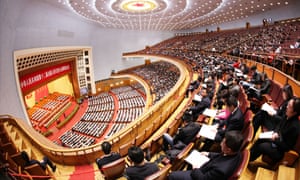Chinese officials 'create 488m bogus social media posts a
year'
Harvard
researchers say leaked documents show bureaucrats fabricate positive posts to
distract from criticism of government
http://www.theguardian.com/world/2016/may/20/chinese-officials-create-488m-social-media-posts-a-year-study-finds

http://www.theguardian.com/world/2016/may/20/chinese-officials-create-488m-social-media-posts-a-year-study-finds

Positive
social media posts are often timed to coincide with Communist party meetings.
Photograph: ChinaFotoPress via Getty Images
Friday 20 May 2016
The Chinese government is fabricating almost
490m social media posts a year in order to distract the public from criticising
or questioning its rule, according to a study.
China’s “Fifty Cent Party” – a legion of freelance online trolls so-named because they are
believed to be paid 50 cents a post – has long been blamed for flooding the
Chinese internet with pro-regime messages designed to defend and promote the
ruling Communist party.
However, the study by Harvard University
researchers (pdf) claims
many of those comments are not posted by ordinary citizens, as previously
thought, but by civil servants who double as online stooges.
An analysis of nearly 43,800 posts found that
99.3% were the work of government employees working for more than 200 agencies,
including tax and social security and human resources bureaux.
The researchers believe such comments are
usually posted in “bursts”, timed to coincide with politically sensitive
periods, such as Communist party meetings, outbreaks of unrest and public
holidays.
For example, hundreds of pro-Beijing messages
were posted after the outbreak ofdeadly ethnic rioting in the western province of Xinjiang in June 2013. A similar
deluge of positive messages emerged during a major political summit in Beijing in November the same year.
The study, based on a cache of documents
leaked from a government propaganda office in eastern China, claims about
half of the 488m propaganda messages posted each year appear on government
websites. The remainder are fed into the social media networks of a country
which has about 700 million internet users.
But while much of the online propaganda was
previously thought to involve attacks on unwelcome ideas or the defence of
government policy, the study suggests most pro-party stooges are not expected
to engage in debate or argument at all.
“They do not step up to defend the
government, its leaders, and their policies from criticism, no matter how
vitriolic; indeed, they seem to avoid controversial issues entirely,” the study’s
authors write of members of China’s “enormous workforce” of online
propagandists.
Instead,
most are about “cheer-leading and positive discussions … which, we infer, is a
strategy designed is to actively distract and redirect public attention from
ongoing criticism, other grievances, or collective action.”
The
explanation, the authors write, is that “distraction is a clever strategy in
information control”.
“An
argument in almost any human discussion is rarely an effective way to put an
end to an opposing argument,” it concludes. “Letting an argument die, or
changing the subject, usually works much better than picking an argument and
getting someone’s back up (as new parents recognise fast).”

No comments:
Post a Comment